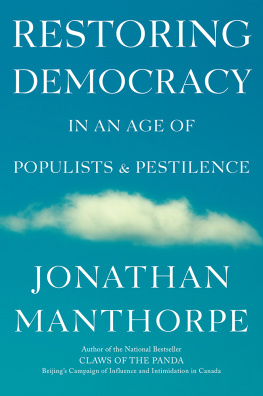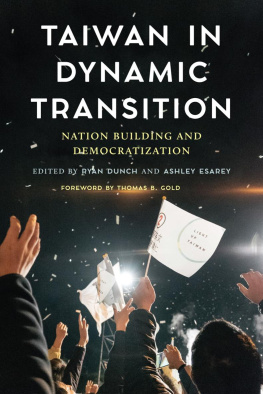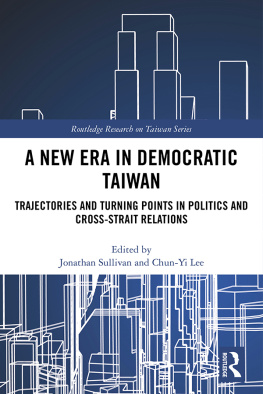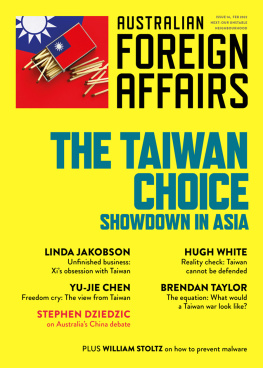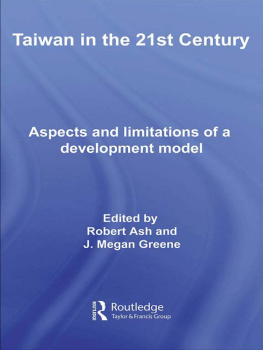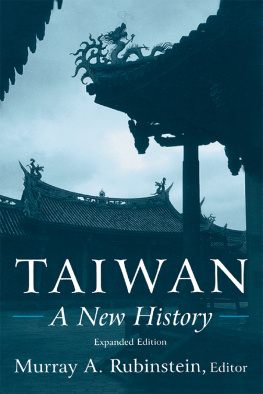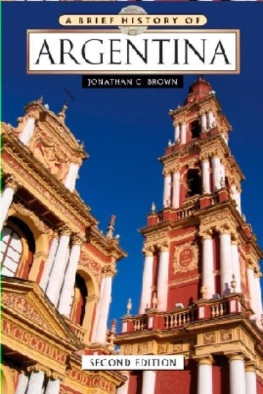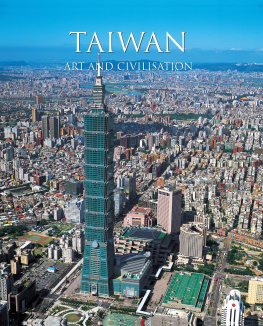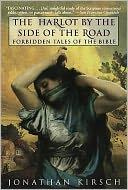Jonathan Manthorpe - Forbidden Nation: A History of Taiwan
Here you can read online Jonathan Manthorpe - Forbidden Nation: A History of Taiwan full text of the book (entire story) in english for free. Download pdf and epub, get meaning, cover and reviews about this ebook. year: 2008, publisher: St. Martin’s Griffin, genre: History. Description of the work, (preface) as well as reviews are available. Best literature library LitArk.com created for fans of good reading and offers a wide selection of genres:
Romance novel
Science fiction
Adventure
Detective
Science
History
Home and family
Prose
Art
Politics
Computer
Non-fiction
Religion
Business
Children
Humor
Choose a favorite category and find really read worthwhile books. Enjoy immersion in the world of imagination, feel the emotions of the characters or learn something new for yourself, make an fascinating discovery.

- Book:Forbidden Nation: A History of Taiwan
- Author:
- Publisher:St. Martin’s Griffin
- Genre:
- Year:2008
- Rating:5 / 5
- Favourites:Add to favourites
- Your mark:
- 100
- 1
- 2
- 3
- 4
- 5
Forbidden Nation: A History of Taiwan: summary, description and annotation
We offer to read an annotation, description, summary or preface (depends on what the author of the book "Forbidden Nation: A History of Taiwan" wrote himself). If you haven't found the necessary information about the book — write in the comments, we will try to find it.
Forbidden Nation: A History of Taiwan — read online for free the complete book (whole text) full work
Below is the text of the book, divided by pages. System saving the place of the last page read, allows you to conveniently read the book "Forbidden Nation: A History of Taiwan" online for free, without having to search again every time where you left off. Put a bookmark, and you can go to the page where you finished reading at any time.
Font size:
Interval:
Bookmark:
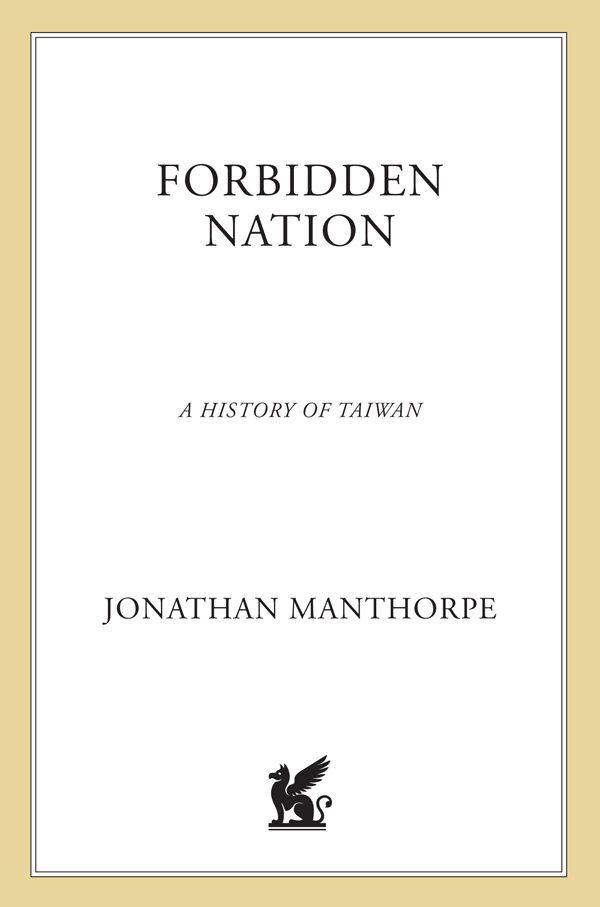

The author and publisher have provided this e-book to you for your personal use only. You may not make this e-book publicly available in any way. Copyright infringement is against the law. If you believe the copy of this e-book you are reading infringes on the authors copyright, please notify the publisher at: us.macmillanusa.com/piracy.
My first visit to Taiwan was in the mid-1970s. Chiang Kai-shek had died a few months before and the government was a colonial military dictatorship thinly glossed with some trappings of democracy. The authorities regarded visiting foreign journalists with only marginally less suspicion than did the mainland government in Beijing. My impression was of a forbidding and unhappy place.
That visit was part of my first tour of Asia and the beginning of my career as a foreign correspondent. I went on to postings in Europe and Africa before returning to Asia and a base in Hong Kong in 1993. I visited Taiwan soon after my return to Asia. It was a different place from the one I remembered. Taipei was vibrant and cosmopolitan, already showing the signs of renewal that have made it one of the most attractive cities in Asia. The general mood was optimistic and life seemed to offer a wealth of possibilities. In Africa I had reported on many countries attempting to make the transition from colonial rule to democracy. Taiwan, in contrast, was clearly making the same transition with many more hopes of success than I had seen in places like Zimbabwe, Zambia, Angola, Namibia, Ethiopia, Nigeria, and South Africa. It was clear too that political and social changes were more soundly based in Taiwan than in some other Asian countries where similar transitions were underway at the same period. I wondered what had given Taiwan its advantage. I started exploring the islands history even as I reported on the final stages of democratic transition in the 1990s. This book is the product of that exploration and my response to what I found.
Writing in English about societies that use variations of the Chinese language and written characters poses a very basic problem. How should one spell Chinese names using the Roman alphabet? This problem goes beyond accuracy; it is a highly political issue. Many sounds used in the Chinese language and dialects have no easy equivalent in English. Several systems have been developed over the years and under different political regimes. Thus the system that a writer in English uses is frequently seen as a political statement of his or her approach to the subject. There are two main systems for the Romanization of Chinese names. There is the Wade-Giles system, first developed in the mid-nineteenth century and which is used on Taiwan, and there is pinyin, a simplified form which was instituted by the Communists after they came to power on the mainland in 1949. I have had long discussions with both Taiwanese and Chinese about which system I should use. My main debt on these questions of English spelling is to Dr. Charles Yang, former president of the Taiwan Cultural Association in Vancouver, and Mark Yang. They gave thoughtful advice not only on the question of names, but on several other aspects of the manuscript.
While I tend to regard the Wade-Giles system as giving a better rendering of Chinese in the Roman alphabet than does pinyin, I have decided to compromise in favor of the reader. Most readers will now be familiar with mainland names rendered in pinyin. For example, Beijing is now established as the English spelling of the name of the Chinese capital rather than the older Wade-Giles version, Peking. Similarly, Mao Zedong is now the more common spelling of the name of the Communist revolutionary leader in place of Mao Tse-tung under the Wade-Giles system. So I have used pinyin spelling for mainland names and Wade-Giles for those on Taiwan. Where older names, such as the Fujian provincial port city of Amoy, appear in quotations I have put the modern name, in this case Xiamen, in brackets.
There are similar questions about how to render Japanese characters into English. There are, for example, several ways of expressing the long o which occurs at the end of many Japanese names such as Tokyo and Kyoto. After much discussion I have decided to follow the stance of most English-language Japanese publications, which is not to include any accent at all.
The gestation period of this book has been so long that the list of those whose help and guidance I should recognize is massive. I must therefore confine myself to people most directly involved or consulted in the production of this book. I cannot neglect to mention, however, my editors at the Southam News ServiceNick Hills, Jim Travers, and Aileen McCabewithout whose support my career as a foreign correspondent would not have followed the same path.
Robert Mackwood of the Seventh Avenue Literary Agency understood the idea of the book from the start and championed it through thick and thin. Toby Wahl of Palgrave Macmillan has been an essential link, tempering and bending the authors inclination to explore the storys side streams toward whats best for the reader. Alan Bradshaw of Palgrave Macmillan has done a splendid job of editing the manuscript as well as engaging in an interesting exploration of those English words and phrases that need translation when they cross the Canada-United States border. I am indebted to many members of Vancouvers community of immigrants from Taiwan, especially Dr. Charles Yang and James Chou, for their encouragement and readiness to spend hours drinking tea and chatting in order to help me understand aspects of Taiwans story. On Taiwan I am grateful to Kang Tien-wang and the staff of the Taipei Artist Village, where much of this book was written; my stay there would have been a more emotionally exhausting experience without the delightful company of that community. Dr. Thomas Chen, Taiwans representative in Canada, and several members of the staff of the Government Information Office in Taipei were of essential help in arranging interviews for me with a broad range of people on the island. I am grateful for the assistance of Peter Chen, Wendy Lin Ching-wen, Carmen Tsai, James Yu, Jason Yuan, and Liu Wei-ling. Several rotations of diplomats at Canadas unofficial embassy in Taipei, the Canadian Trade Office, have been of unstinting assistance during my many visits to Taiwan over the years. Office directors David Mulroney, Ted Lipman, and Gordon Holden have all offered advice and analysis from their bountiful experience in the region. Many staff members have been equally helpful. In the context of this book I must mention James Mitchell, Weldon Epp, Sylvia Yan, and Sumeeta Chandavarkar.
Among those who talked to me about their visions of Taiwans past, present, and future were Mayaw Biho, convener of the Amis Tribe Film Festival, Dr. Bien Chiang of the Institute of Ethnology at Academica Sinica, and Ku Lin-lin of the Graduate School of Journalism at the National Taiwan University. There was Voyu Yakumangana of the Association for Taiwan Indigenous Peoples Policies; Wei Ti, professor of mass communications at Tamkang University and a member of Taiwan Media Watch; and Dr. Chao Chien-min of the Sun Yat-sen Graduate Institute for Social Science and Humanities at Chengchi University. Yao Chia-wen, president of the Examination Yuan, was generous with his time recalling his experiences of the 1979 Kaohsiung Incident, and as a political prisoner afterward, and discussing his current plans for Taiwans constitutional reform. Dr. Ho Szu-yin, the director of International Affairs for the Kuomintang and professor at the Department of Political Science of Chengchi University, was a valuable source of views on Taiwans political present and future. Dr. Hung Chien-chao of the Kuomintang-linked National Policy Foundation was a pleasure to meet and talk to after having enjoyed and benefited from his writing for so many years. Peng Ming-min, senior advisor to President Chen Shui-bian, and the father of the modern movement for Taiwan nationhood, was as welcoming and eager to exchange views as he has always been. Dr. Leng Tse-kang of the Institute of International relations at Chengchi University was most helpful in giving regional context to the Taiwan issue. Lin Sheng-yi of the Taiwan Indigenous Culture Alliance showed me aspects of aboriginal history and modern influences I had not discovered elsewhere, as did Dr. Tong Chun-fa of the College of Indigenous Studies at Donghua University. Dr. Wu Shuh-min, the President of the Foundation of Medical Professionals Alliance in Taiwan, gave me fresh insights into the passion and logic that drives many of the islanders desire for internationally recognized nationhood. Chao Yu-ling, professor of choreography at the National Taiwan University of Arts, was a patient tutor on the emergence and expression of a distinct Taiwanese cultural identity. I am indebted to Joann Yu, who made the index with care and imagination in the face of a seemingly impossible deadline.
Font size:
Interval:
Bookmark:
Similar books «Forbidden Nation: A History of Taiwan»
Look at similar books to Forbidden Nation: A History of Taiwan. We have selected literature similar in name and meaning in the hope of providing readers with more options to find new, interesting, not yet read works.
Discussion, reviews of the book Forbidden Nation: A History of Taiwan and just readers' own opinions. Leave your comments, write what you think about the work, its meaning or the main characters. Specify what exactly you liked and what you didn't like, and why you think so.

